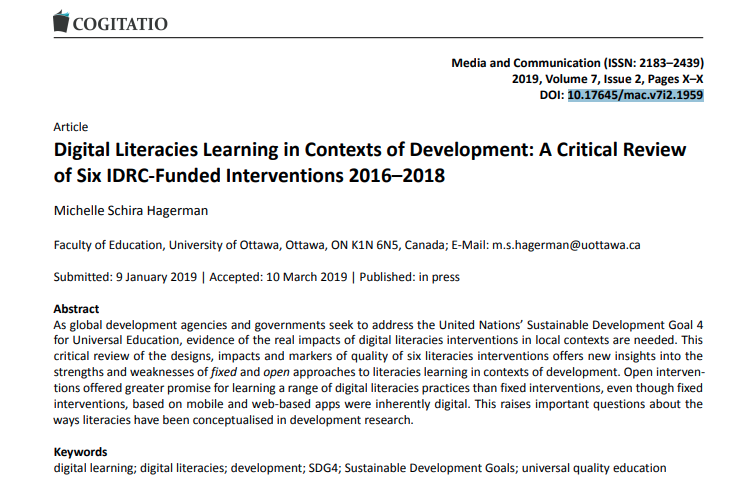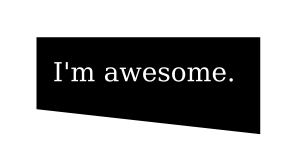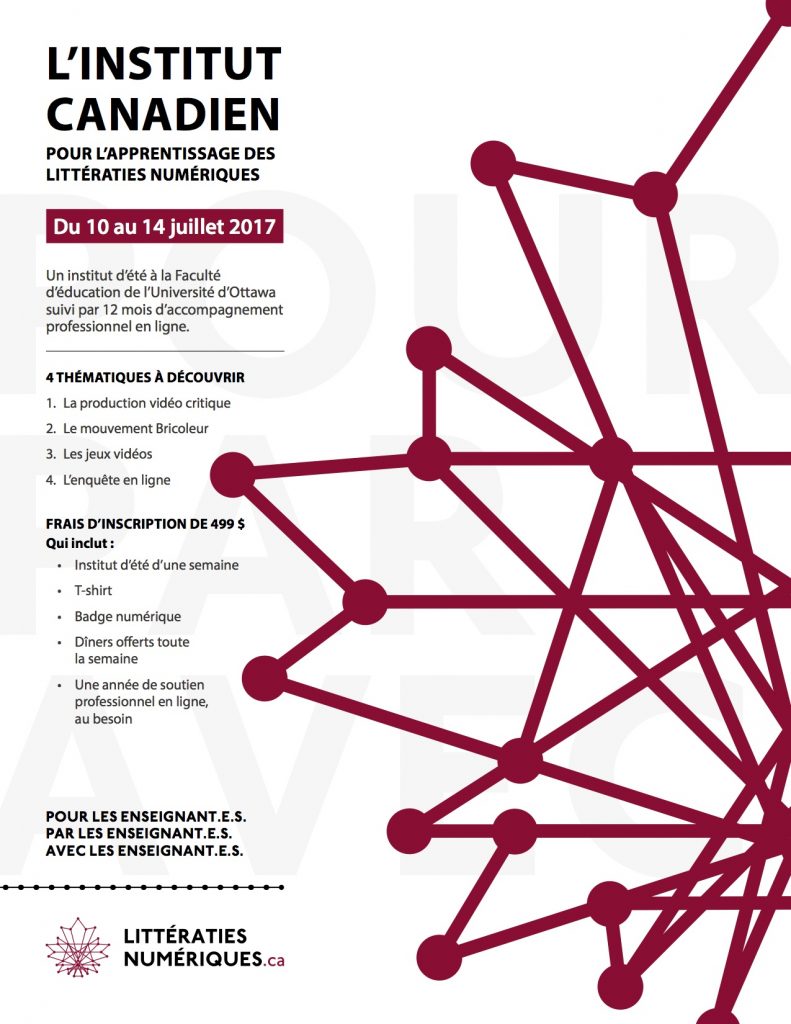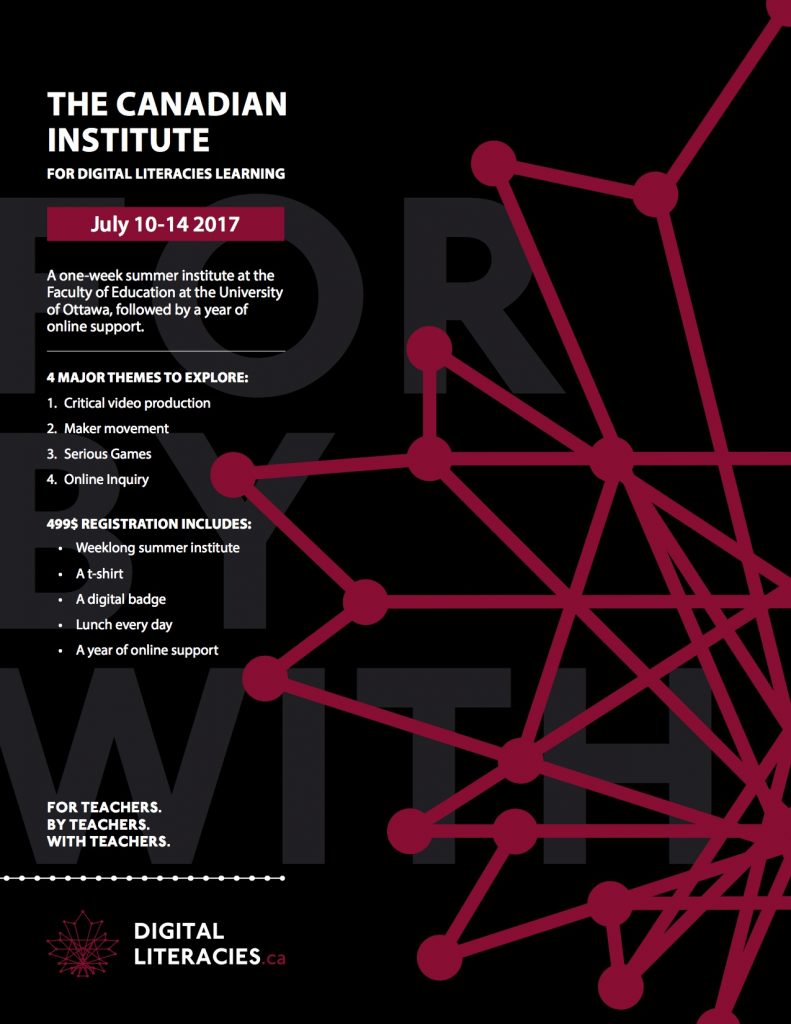
In July of 2018, the International Development Research Centre of Canada invited me to conduct an external review of key findings in a set of 44 reports of research on digital learning. The reports, funded between 2016 and 2018 were incredibly diverse in their methods, questions, and findings. That report (currently in press with the IDRC) can be found here.
At the same time Dr. Hiller Spires of NC State University issued a call for papers for a special edition of Media and Communication called “Critical Perspectives on Digital Literacies: Creating a Path Forward”. My paper, entitled Digital literacies learning in contexts of development: A critical review of six IDRC-funded interventions 2016-2018 will appear in this special edition and should be published online by the end of May, 2019. Thanks to the open access policies of this journal, I can share a pre-print of the article here for anyone interested in reading the full text.
]]>In support of this initiative, I was thrilled to be invited to offer up some thoughts on digital literacies, and the ways that technologies and mathematical thinking are connected. Check out the video 
 Teacher candidates have asked me this question in a variety of ways. Sometimes, they say they’re not comfortable putting themselves “out there”. Other times, they tell me they’ve never really shared their ideas publicly before, and this makes them nervous. Sometimes, they say they just want to keep their thoughts private. In conversation with experienced teachers, a similar theme has often emerged too. Teacher candidates are not alone in this worry. When we talk about working and serving students in a world where the Internet is the most important medium for literacies learning, even seasoned teachers get a little nervous.
Teacher candidates have asked me this question in a variety of ways. Sometimes, they say they’re not comfortable putting themselves “out there”. Other times, they tell me they’ve never really shared their ideas publicly before, and this makes them nervous. Sometimes, they say they just want to keep their thoughts private. In conversation with experienced teachers, a similar theme has often emerged too. Teacher candidates are not alone in this worry. When we talk about working and serving students in a world where the Internet is the most important medium for literacies learning, even seasoned teachers get a little nervous.
I discussed this with a teacher at a conference last spring. She was a woman, probably mid-forties-ish like me, who by any reasonable assessment had PLENTY of amazing ideas to share. She told me, “You know, as a girl, I was socialized to not have opinions, and especially to not have or express controversial ones. As an adult, even though I know I have ideas that others would be interested in hearing, I struggle to share them. I just feel like I shouldn’t stand out, or present myself as some kind of expert. It just feels socially unacceptable to have a website focused entirely on me and my ideas.”
Given all of this, when the B.Ed. program asks students to create a representation of self — of a professional self that is emerging and that they cannot yet know — we recognize that for many, this feels incredibly hard, and for good reason. We are asking students who don’t yet know who they are as teachers to write about themselves and their work in a public space.
The Digital Hub strategy asks teacher candidates to construct new professional identities and to share these identity shifts with others. For many, this may call into question years of living and moving in the world as quiet, polite, self-effacing, agreeable people. This activity may conjure worries about what will happen. What if, for example, they are viewed and judged by others as a tall poppy? I imagine the self-talk might go something like this: Sharing ideas, and taking credit for all of my good work on the Internet? Other people do this, not me. Usually, those people are famous. Or wanting to become famous. Or they’re Youtubers. Or they’re attention-seeking narcissists. These labels definitely do not apply to me. Plus, there are trolls on the Internet. There are bullies on the Internet. There are good reasons to not be public on the Internet.
In her 2005 book, Places of Learning: Media, Architecture and Pedagogy Elizabeth Ellsworth writes about transitional spaces. She writes, “Unlike spaces that put inside in relation to outside in an attempt to make the inside comply with the outside, transitional space opens up a potential for learning about the outside without obliterating the inside […] Transitional space allows us to use the environment to get lost in oneself, to make a spontaneous gesture, to get interested in something new, to surprise oneself, to organize bits of experience into a temporarily connected sense of self and then to allow those bits to un-integrate so that they can be surprised by themselves and reconfigured in new ways. And, so they can be reconfigured into new thoughts and ways of being with self and others.” (p. 61).
I think that Digital Hubs in Teacher Education can be transitional spaces. They may call into question how many of us live and move in the world but they also open up possibilities for new discovery. They invite us to surprise ourselves. They are an invitation to reconfigure bits of self into something our selves have never been before.
As a professional preparation program, we know that we are asking teacher candidates to think in challenging new ways about who they are becoming as teachers. But, as I write on the Institutional Vision page and in the introduction to the Digital Hub, there is much to be gained from an authentic investment in this work. Although many candidates might see the real purpose of a website as a way to position themselves in the job market, we see it as an opportunity to scaffold transition. We see the digital hub as an opportunity for every teacher candidate to learn essential digital literacies skills that serve teaching and learning purposes, to think deeply and make decisions about the very real tensions that now exist between their lives as private citizens and their professional lives as public intellectual workers. We see it as a place to engage in the processes of professional reflection that teachers have always done as they learn and grow. Substantively, it will be the content of the digital hubs that showcase each teacher candidate’s fit for the jobs to which they apply in future. So, as with everything about learning, it’s the journey, the process, and the getting there that prepares us for what’s next.
To me, owning one’s story and sharing the great work that one does as a teacher is not shameless self-promotion. Rather, as teachers, we enter into these open spaces because we are committed to bringing all that we are and all that we do to serve the public interest. As a teacher myself, I feel a deep and enduring responsibility to make my work visible to the public I serve. I know that students who don’t know me won’t choose to learn from or with me. If they can Google me and learn about what I do, what I have written, where I used to work, the kinds of things I value — then maybe that helps some students to identify a connection they wouldn’t otherwise have been able to make. As a researcher, I also know that colleagues who don’t know my work won’t choose to work with me, or choose to learn from the things I have written. So, in this way, being open about my thinking allows me to connect with others who do similar work. It opens opportunity for collaboration and learning. Fundamentally, I use the Internet as one way to fulfill my responsibilities to teaching and to the stakeholders I serve. And service — I am pretty sure that is a shared value that brings all of us to this profession.

 ]]>
]]>
The Canadian Institute for Digital Literacies Learning | L’Institut canadien pour l’apprentissage des littératies numériques is an exciting blended learning experience for Canadian K-12 teachers focused on exploration, collaboration and innovation. For me, this Institute represents years of thinking, of working, of building understandings and developing relationships with scholars whose work has inspired me to think, to act, to share. And, it is also a beginning. I hope this Institute will grow into a nationally representative network of teachers learning together and sharing their knowledge about what works in their classrooms to support development of foundational digital literacies knowledges, skills and dispositions. If you are K-12 teacher working in a Canadian school, I hope you will join us in Ottawa this summer, July 10-14, 2017.
So, feeling all of these things, I retweeted Minister Morneau’s announcement and then tweeted at him directly.
@Bill_Morneau This choice is beautiful, timely and important. Thank you for your leadership on this.
— Michelle S. Hagerman (@mshagerman) December 8, 2016
And a few minutes ago, I received a notification that an account called @dacian_draco had quoted my tweet. This gave me pause. I don’t know this person. My tweets are usually for my students and colleagues. I don’t actively try to cultivate a massive Twitter following. I think about what my community of students and colleagues might find useful, helpful or of value, and I usually keep my communications focused on those goals. Today, though, was different. The Viola Desmond decision matters and I wanted to express my support for the choice publicly. So, I did. And then, it was used by someone else in way, that after careful scrunity, seems completely contrary to my position or reason for expressing my support for the banknote decision. The words Every.Single.Time. were used with my tweet quoted below. What did this suggest or mean? I really cannot know for sure, but other Tweets on this account’s feed express racialized hate. Tweets on this account seem to align with the alt-right movement, and with ideologies that promote white power and privilege.
I have helped many students to cultivate professional digital presences, and have helped many colleagues and students to create social media accounts, including Twitter accounts. During these conversations we have always talked about controlling our own messaging and engaging in respectful conversations that add value to our professional networks. And yet, here one of my tweets has been co-opted by someone whose interests seem antithetical to my own; whose ideas are offensive to me.
So I really had to consider, what should I do?
Doing nothing was a non-option. However, aware that a response on Twitter might lead to a ball of stress that I’m not interested in inviting, I decided a blog post would be my response. Public, but measured, and not limited by the constraints of the microblog.
Fundamentally, I cannot control how others use my tweets, but I can disagree with their uses by others. As a participant in social media spaces, I understand the risks. I may find the ideas expressed at this account offensive, but I recognize this person’s (or these persons’) right to express ideas on this platform. I will not condemn the use of my Tweet, but I will also not let it pass unrecognized. In sharing my thoughts on the Viola Desmond decision, I added my voice to the national discussion of the choice and its importance. And the response to my Tweet by an alt-right Twitter account tells me a great deal about where my priorities need to be. It tells me that in schools, we must help all children to feel a deep sense of community, to feel valued, to have agency and to have experiences that enable them to know and understand why diversity makes us stronger. This tweet inspires my own resolve to help students and teachers in Canada to become active, engaged, social-justice oriented participatory digital citizens.
If we are to realize the vision that Viola Desmond had for a more just Canada, I’m saying it here — I’m ready to do this work. My sleeves are rolled up.
—
Postscript: Twenty-six years ago today, I was injured in an automobile accident that claimed the life of a friend. I dedicate this post to her memory.
]]>
If you’re interested in contributing to this research and have about 15 minutes of time, you are invited to submit responses to the shorter version of the survey here.
]]>
Most importantly, I hope the session prompts students to generate their questions about digital literacies, and gets them thinking critically about how to support digital literacies learning through their own teaching practices.
Here is the link to the presentation: http://bit.ly/onlineinquiry
]]>Rebecca is a Doctoral Student at the University of Ottawa and her dissertation will document and analyze the impact of her blog on readers. It’s important, inspiring work that sits at the intersections of several areas of study including, but probably not limited to, literacy, technology, health, community, culture, relationships, learning. And so, I asked Rebecca if she might have 30 minutes or so to share some of her thoughts about the role of social media to support learning for students in my #EDU5287 Class called Emerging Technologies and Learning.
Interestingly, several students in my class are health care professionals themselves. I hope the conversation is especially supportive of their learning. I hope it helps to expand conceptions of social media and the ways that they might leverage patient blogs to teach, and to inform their clinical practices.
Key points from Rebecca’s talk include:
- Patient blogs can give clinical professionals access to the ways that patients think about their disease. Rebecca described the example of one physician who reads patient blogs to gain access to the ways that non-specialists describe what is happening to their bodies, or in their bodies. This has helped the physician to understand and interpret patients’ words and, importantly, to diagnose patients.
- Access to other patients’ treatment plans has empowered Rebecca to attend medical team meetings with a conversation starter. She values the special disciplinary knowledge that her medical care team brings to the conversations, of course, but she has found it helpful to present information informed, in part, by others’ experiences so that she feels all possibilities are explored before decisions are taken for her particular treatment plan.
- Rebecca offered many insights about how to use social media to tell her story without revealing information that is too sensitive, or might give any insight into the identities of her physicians. This is an important one for all educators to think about. Rebecca has a website called http://shouldiblog.org/ for anyone considering blogging their lived experiences with Cancer. It is of value to anyone starting a blog, in my view. The issues she explores on the site are germane to K-12 teachers, counselors, and health care professionals too.
- Evidence of impact in Rebecca’s work often comes in the form of comments that people share. “You helped me to understand my sister’s experiences” or even just “thank you” give Rebecca some perspective on how her social media work is supporting her readers.
Here’s the conversation. Students in #EDU5287 will see this in Module 5 that focuses on uses of social media to support learning. Rebecca summarized the talk at her blog too.
For friends in the digital literacies community, what questions does Rebecca’s work raise for you?
[youtube https://www.youtube.com/watch?v=tz9lqRaf3ks]
]]>